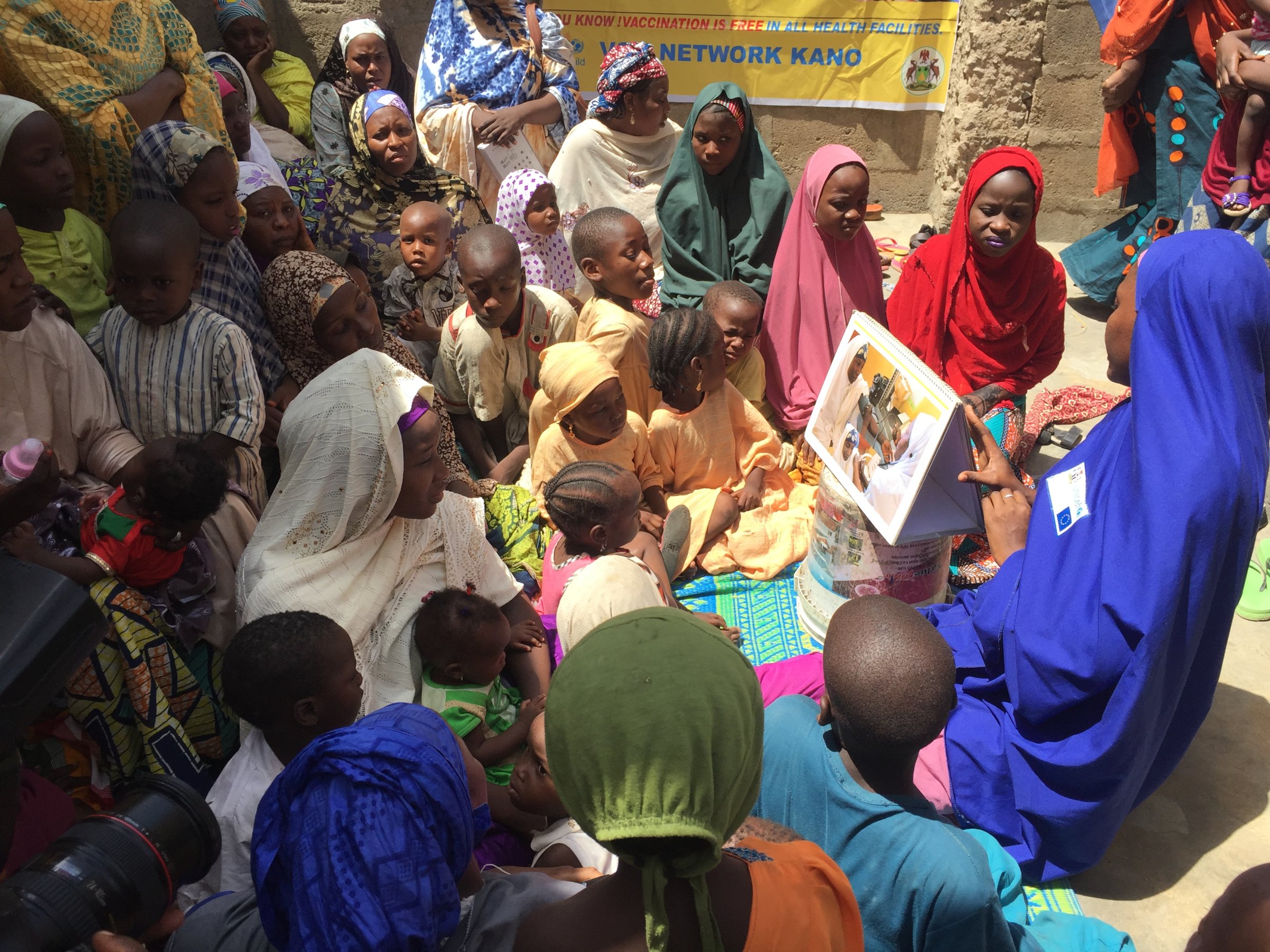
Ramlatu Musaa never met the Emir of Kano State in northern Nigeria. Of course, Ramlatu Musaa hasn’t met a lot of people. She’s only about a week old, born in Kano on April 29, 2018, and yet in some ways, the Emir may have helped saved her life.
Two years ago, the polio vaccine was available in Nigeria, but it was still frequently rejected by families. Stray rumors continued to circulate that it was unsafe, able to sicken children and render them infertile. So before one of that year’s national vaccination campaigns began, the Emir—a hereditary leader descended from a ruling family—appeared at a public ceremony and called for a vial of polio vaccine to be brought to the stage. With the audience watching, he broke its seal and drank down its entire contents. And with that, vaccine resistance in Nigeria retreated one more step.
Ramlatu just got her own, much smaller, two-drop dose of the vaccine, the first of eight polio vaccinations she will receive by the time she is nine years old. As it happens, the seven-days-old mark, which immunological science says is the time that the first vaccine dose should be administered, is also when Nigerian tradition says a baby’s naming ceremony should be held. So for Ramlatu, as for many Nigerian newborns, the two occasions were combined.
Her celebration and vaccination took place in a small courtyard in a crowded Kano neighborhood, and the event was packed with mothers and children, along with a few representatives from Rotary International, UNICEF and the Bill and Melinda Gates Foundation. That provided an opportunity for the health care workers to review basic health and immunization guidelines with the mothers, as well as to vaccinate half a dozen or so other children who were due for their next doses. One modest ceremony resulted in an entire community’s health being improved. Opportunity-seizing like that has played a significant role in bringing polio to the edge of extinction here.
“When community surveys were conducted and we asked why children hadn’t been at home during a previous round of house-to-house vaccinations, the answer was often that they were at social events,” says Dr. Mohammed Soghaier, polio field coordinator for UNICEF. “So we began using weddings, naming ceremonies and more as occasions to get them vaccinated.”
Vaccine gaps in Nigeria were also caused by something that doctors regularly see in wealthier part of the world, as well: denial. Parents will head straight for a doctor or hospital when a child is sick or injured, but it can be hard to motivate them to seek preventive medical attention for a disease their children don’t have and may never get.
In Nigeria, the trick was to expand the services for acute needs—which had to be expanded anyway—and fold in vaccinations too. Health camps were thus established in communities around the country, attracting families who then get treated for current ailments and protected against prospective ones.
MORE: How Nigeria’s Start-Stop Immunization Battle Is Winning the War to Eradicate Polio in Africa
“The camps are a kind of bait,” says Dr. Imam Wada Bello, an incident manager for the Emergency Operations center in Kano. “They provide health education, as well as malaria testing, treatment for diarrheal diseases and nutritional guidance. And they also provide vaccines.”
The blunter term for the strategy is “capture and vaccinate,” but whatever it’s called, it works. “We’re up to 90% vaccine coverage in Kano,” Dr. Bello says with no small amount of pride. “We’re going to be together in this until the end.”
Mosques, which are so central to communities in northern Nigeria, are also focal points for health education. Despite vaccine resistance in the past, the Imams are now fully engaged in the polio eradication campaign. On May 5, Muhamad Nasir Adam, the Imam of Kano, visited the home of Sarkin Yakin, the Emir’s representative, to talk about local Islam’s endorsement of vaccination.
“God asks people to seek protection and prevention from any harm that might come to them,” he said. “A healthy mind and brain will not come from an unhealthy body. We are committed to make sure that a virus gap will not form from a weak chain of religious leaders.”
A similar theme was echoed at a small mosque in the Fagge district of Kano shortly before Friday prayers. A group of men, many fathers of small children, gathered with Imam Mujtaba Adam Saleh for one of their twice-monthly meetings to discuss health in general and polio eradication in particular. Equal parts pure science and deep faith, the gatherings have had an impact. At the end of that day’s session, one of the men stood and formally declared, “In the past, there were vaccine refusals. Now we are fully convinced and we understand. We are thankful.”
Challenges remain. Ramlatu won’t have any more naming ceremonies to ensure that she receives the next seven polio vaccines she needs. And even a little carelessness or complacency could bring Nigeria’s twenty-month stretch of zero cases of paralytic polio to an end. These days though, the fight to wipe out the disease doesn’t come just from the tip of a vaccine vial. It comes from the words of an Imam and the commitment of a parent and the lessons taught by a health care field worker. They are powerful weapons, and Nigerians are increasingly confident that they will do the job.
More Must-Reads from TIME
- Why Biden Dropped Out
- Ukraine’s Plan to Survive Trump
- The Rise of a New Kind of Parenting Guru
- The Chaos and Commotion of the RNC in Photos
- Why We All Have a Stake in Twisters’ Success
- 8 Eating Habits That Actually Improve Your Sleep
- Welcome to the Noah Lyles Olympics
- Get Our Paris Olympics Newsletter in Your Inbox
Write to Jeffrey Kluger / Kano at jeffrey.kluger@time.com